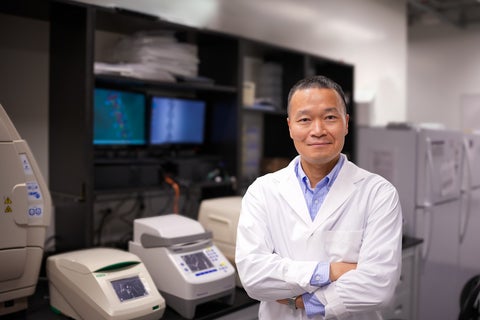
Innovation through DNA
World-leading research earns Dr. Juewen Liu a Canada Research Chair
By Vanessa Parks
Internal Communications and Engagement Specialist
What’s the connection between environmental contaminates and improving the treatment of dry eyes? For Dr. Juewen Liu, it’s DNA.
Liu is a newly named Tier 1 Canada Research Chair (CRC) in Biosensors and Bionanotechnology. Liu has also recently received the 2024 Award of Merit from The Federation of Chinese Canadian Professionals (Ontario) Education Foundation for his outstanding work in this field. He and his team are developing DNA-based biosensors for detecting things like heavy metal ions in environmental water and lactate in blood.

Liu’s work focuses on the chemical function of DNA. “We know that DNA stores our genetic material because that is its biological function,” says Liu. “But as chemists, we see that DNA can have a similar function to protein – not in nature, but in the lab. My lab team is isolating DNA sequences that can recognize all kinds of things, from metal ions to small molecules to tissues. When we have that affinity binding between a particular sequence and a target, we can use this sequence as a biosensor for detection or for therapeutic purpose.”
Liu’s research comes together at the intersection of chemistry and biology. As a chemist, he’s interested in how DNA binds to his target molecules, but biology offers the tools that make this possible. “To obtain this DNA sequence, we need to use molecular biology techniques to be able to fish out a particular DNA sequence from hundreds of trillions of random sequences,” he explains.
The environmental and health care impacts of this research are far-reaching. Most recently, Liu’s team has isolated a DNA sequence that can bind to cornea and help with the treatment of dry eye. This sequence allows cyclosporin A, an FDA-approved drug for dry eyes, to remain on the surface of the eye even after the liquid is gone. This ensures the ingredient doesn’t wash away, as it does in traditional formulations.
The funding that Liu receives from NSERC (The Natural Sciences and Engineering Research Council) as part of his CRC will allow his team to expand in three key areas. They want to collaborate with computer scientists to incorporate artificial intelligence and machine learning into their program to better analyze and predict sequences that can combine to their target molecules.
They also plan to expand the types of molecules they’re dealing with. “Right now, we’re working with small molecules, and we plan to expand to proteins,” says Liu. “The CRC funding will give us the additional capability to do that.”
And finally, they plan to push for more practical applications and work more closely with engineers to protype sensors.

Liu will also be able to add to the team of graduate and undergraduate students that carry out the day-to-day work in his lab. “Mentoring students is the fun part of my job,” Liu says. “I love to see their growth. When they first come to the lab, they are new to my specialization and eager to learn. And when they leave, I wish I could keep them for longer because they’re now extremely good at the work. That change over the years is where I feel I make some impact.”
Liu feels lucky to be at Waterloo where he can engage in what he calls curiosity-driven research. “If I’m curious about something, it seems like I can always find some resource to investigate it,” Liu says. “Waterloo Chemistry is a great place, and I appreciate having the opportunity to explore.”